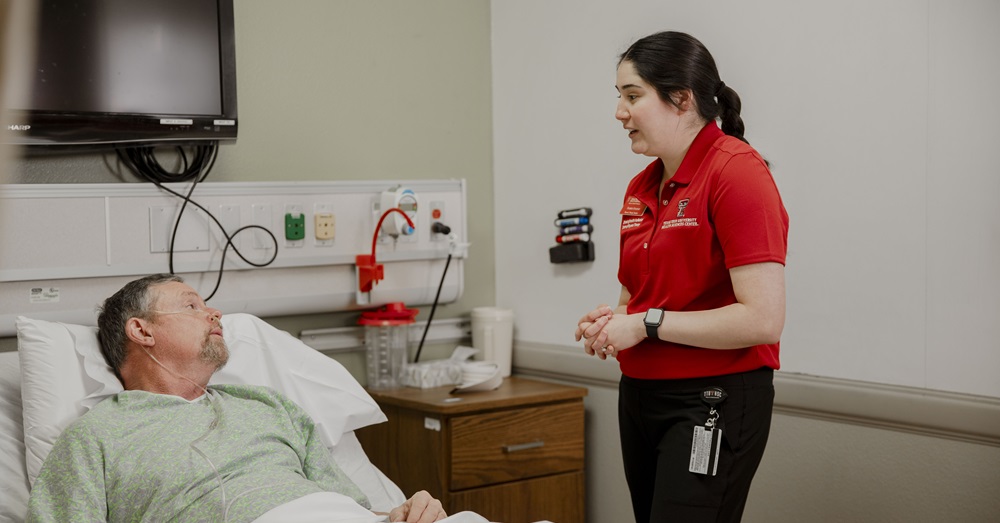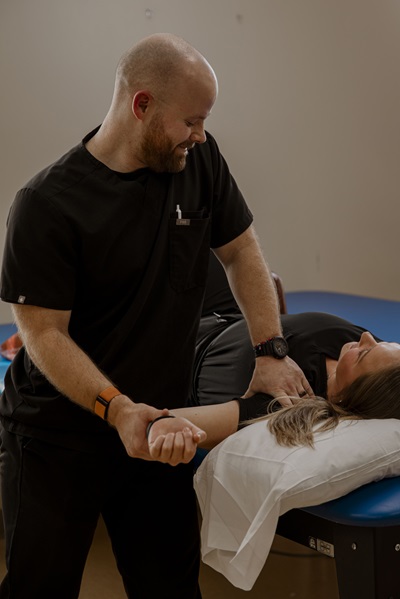Exceptional Value, Outstanding Outcomes: TTUHSC’s DPT Program

TTUHSC’s Doctor of Physical Therapy (DPT) program has been around for nearly 40 years. In fact, it was the first program to “graduate” a Doctor of Physical Therapy student in Texas, according to Dr. Nathan Burgess, PT, ScD. Burgess is the Associate Program Director and a fellow graduate of the TTUHSC DPT program. We sat down with him to learn more about the program and how it is set apart from others across the state and country.
Fast Facts:
- The DPT program at TTUHSC is a three year, nine semester program of 100 credit hours.
- The program is accredited as a single program, but TTUHSC distributes students across three campuses in Amarillo, Lubbock and Odessa, TX as part of its charge to serve the western half of the state of Texas.
- The program has a live, synchronous, interactive video conferencing system. So all students attend lectures concurrently on their home campus, and the classrooms are linked together via the video conferencing system.
- There are faculty on all three campuses, and all faculty participate in content delivery to all students within the cohort.
- Hands-on labs are held locally with content area experts on each campus.
Student-First Mindset
Burgess shares that the program has seen success with this three campus system for 30 years, growing a faculty of clinical experts that offer a “student-first” mindset.
“We really work to partner with our students to help them be successful in the program and ultimately in the clinic,” Burgess says. “I tell students all the time, ‘you have to do the work, but our faculty will help you get there. If you let us know how we can help you, we will help you be as successful as you can be.’”
Exceptional Value

“Right now, we're approaching 300 physical therapy programs in the country. About 55 percent of those are private institutions, and the other 45 percent are typical public institutions,” he explains. So, there's a lot of choice in where students want to go, but a big factor has to be cost.”
CAPTE is the Commission on Accreditation in Physical Therapy Education and is the accrediting body of physical therapy programs in the United States. CAPTE collects data every year, looking at things like cost.
Burgess shares that in private institutions, annual tuition is approaching just over $43,000 per year and in-state public tuition for public institutions is just over $22,000 per year. That doesn't count fees and other costs.
“This is where I really think our program has an exceptional value. At Texas Tech University Health Sciences Center, our annual tuition is just around $8,800 per year, which is way below the national averages.”
He continues, “CAPTE also looks at total cost, tuition and fees and other expenses that you might have in the program, and the national averages for private institutions for total program cost is just over $124,000 for physical therapy school, and for public institutions, the national average is $74,000,” he says. “At TTUHSC, we're still below $50,000 for a 100 credit hour, three-year program.”
Burgess notes that value includes world-class facilities on all three campuses, top-tier faculty and clinical experts, and a values-based culture - ultimately leading to outstanding outcomes.
Outstanding Outcomes
What are those outcomes exactly? Burgess breaks it down for us:
One metric that all programs are measured against is performance on the National Physical Therapy Exam (NPTE), the national licensure exam. CAPTE looks at NPTE performance across all programs, and they publish that information, including first time pass rates.
“Our program’s first time pass rate over the last four years is right around 95 percent,” Burgess says. “The national average for first time pass rate is around 87 percent over the same time frame.”
TTUHSC graduates are not only exceeding national averages, but they are also consistently above the national average on overall and content-area scores. But Burgess says, the program’s success goes beyond these scores. The outstanding outcomes reach the clinic as well.
“We have clinics all the time tell us, ‘send us your students, we want to have them here,’” he says. “Our students have no trouble finding employment, and our program has a great reputation across this area of the United States, especially in Texas.”
Making a Choice
Burgess says that when speaking with students trying to narrow down programs, he suggests looking at these things:
- Accreditation status (TTUHSC has consistently received maximal accreditation)
- Faculty and the culture
- Cost
He also encourages getting a feel for the program on-site and in-person.
Ultimately though, Burgess shares that students have to find the best fit for them, and if TTUHSC is that perfect fit, the program is committed to partnering together to grow them to be an outstanding entry-level clinician at an exceptional value.
Related Stories
TTUHSC Receives $1 Million Gift from Amarillo National Bank to Expand and Enhance Pediatric Care in the Panhandle
TTUHSC School of Medicine leaders accepted a $1 million philanthropic gift from Amarillo National Bank on Tuesday (Feb. 10), marking a transformational investment in pediatric care for the Texas Panhandle.
Texas Tech University Health Sciences Center Permian Basin Announces Pediatric Residency Program Gift
TTUHSC Permian Basin, along with the Permian Strategic Partnership and the Scharbauer Foundation, Feb. 5 announced a gift that will fund a new pediatric residency.
The Ph.D. Programs that Shape Health Care
The Graduate School of Biomedical Sciences Ph.D. programs at TTUHSC provide the foundation, mentorship and research opportunities you need to pursue groundbreaking work.
Recent Stories
National Academy of Inventors Names TTUHSC Faculty Senior Members
The National Academy of Inventors (NAI) has designated two current and one former TTUHSC faculty researchers as Senior Members.
The John Wayne Cancer Foundation Surgical Oncology Fellowship Program at Texas Tech University Health Sciences Center Announced
TTUHSC is collaborating with the John Wayne Cancer Foundation and has established the Big Cure Endowment, which supports the university’s efforts to reduce cancer incidence and increase survivability of people in rural and underserved areas.
TTUHSC Receives $1 Million Gift from Amarillo National Bank to Expand and Enhance Pediatric Care in the Panhandle
TTUHSC School of Medicine leaders accepted a $1 million philanthropic gift from Amarillo National Bank on Tuesday (Feb. 10), marking a transformational investment in pediatric care for the Texas Panhandle.
